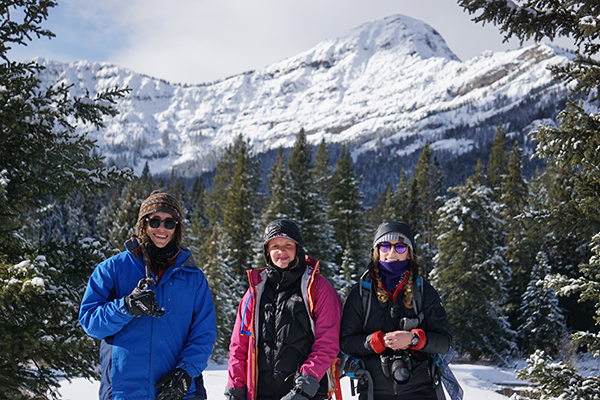Home / Photo Gallery / 2017 / Exploring Ecological Relationships in Yellowstone National Park
Exploring Ecological Relationships in Yellowstone National Park
Home / Photo Gallery / 2017 / Exploring Ecological Relationships in Yellowstone National Park
Exploring Ecological Relationships in Yellowstone National Park

From November 26th to December 3rd, CWC faculty Jacki Klancher and Darran Wells spent 8 days with students traveling to Yellowstone National Park to pilot a new certificate program. The program, called the certified interpretive guide (CIG) training, is a 32-hour intensive training that teaches trainees how to better relate scientific and cultural resource knowledge to universal concepts (love, family, overcoming adversity etc.) to better inspire and engage their audiences. The goal was to assess the applicability of the training to our students and to use the trip to enable faculty to gain certification as well.
The survey is in: students LOVED this training. They learned how to be more effective communicators, spent two days studying the ecological landscape of Yellowstone National Park, and shared the week with their peers and faculty. Students agreed unanimously that the training was engaging, inspiring, has broader applications to other forms of presenting (writing; film; essays etc.) and will broaden their professional horizons and increase their chances of gaining meaningful employment.
Darran Wells and Jacki Klancher will pursue certification to become trainers of this program. They will explore options to offer the program in-house and they will investigate funding opportunities to take students to Yellowstone for this training. Although the classroom portion of the training was spectacular, the allure of this program is the opportunity to explore Yellowstone National Park. Because the trip also included two full field days in the park, plus other shorter outings in the park throughout each day of the training, the instructor’s use of the local environment certainly enhanced the quality of the experience.
What we know at present is this: this event, engaged, inspired, and delighted our students. They returned from this trip invigorated and with very positive associations to CWC, to the participating faculty, and to the host organization in YNP. ”
Jacki Klancher
2660 Peck Avenue
Riverton, WY 82501
(307) 855 – 2000
Campus Map
120 Enterprise Blvd.
Lander, WY 82520
(307) 332 – 3394
Campus Map
240 S. Glenwood St #124
P.O. Box 4795
Jackson, WY 83001
(307) 733 – 7425
Campus Map
302 W. Ramshorn
P.O. Box 175
Dubois, WY 82513
(307) 455 – 2625
Campus Map
© 2024 Central Wyoming College – All Rights Reserved